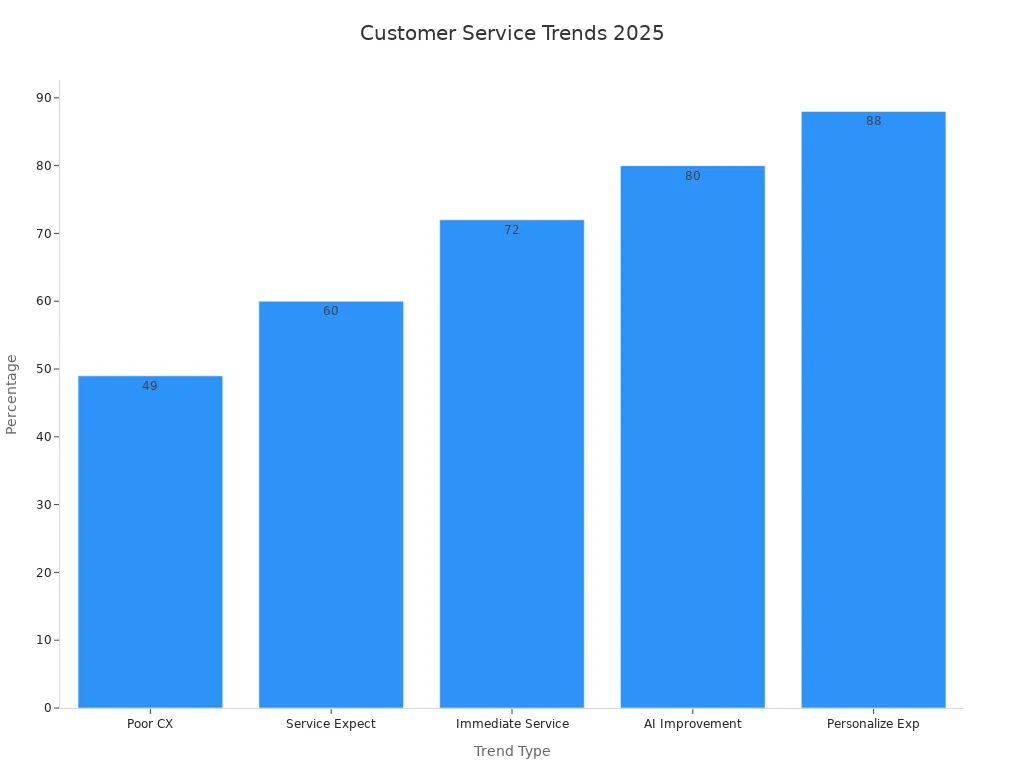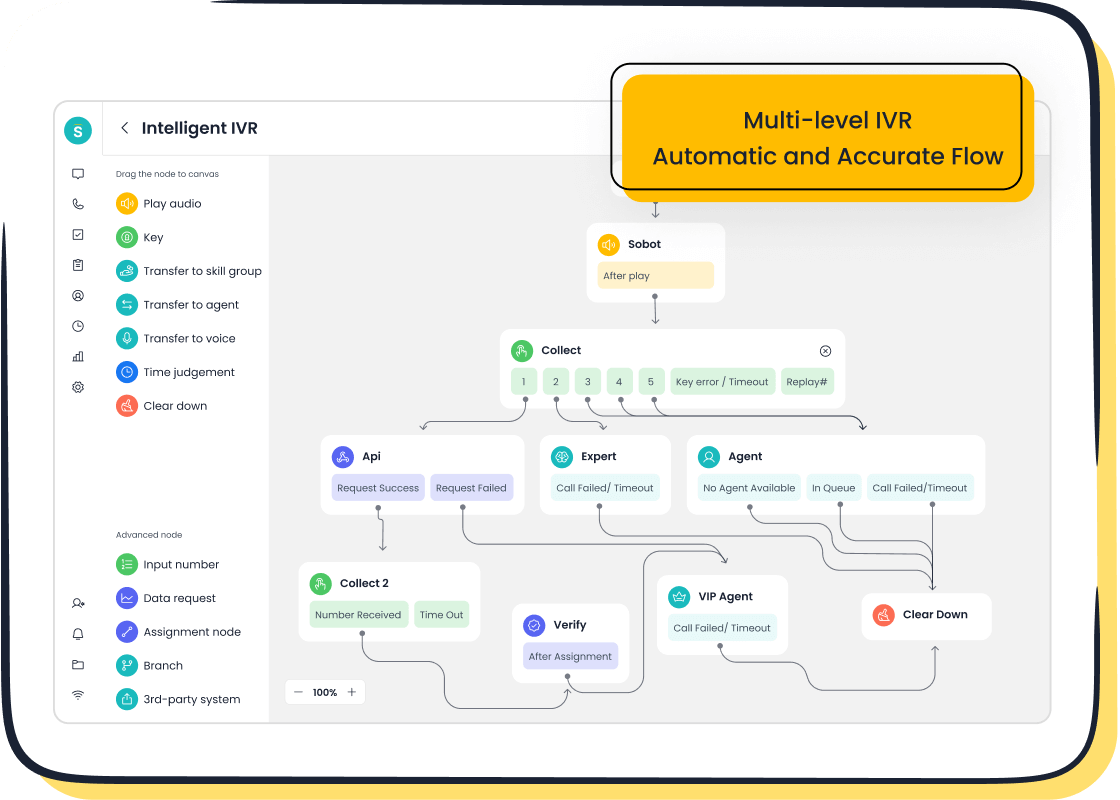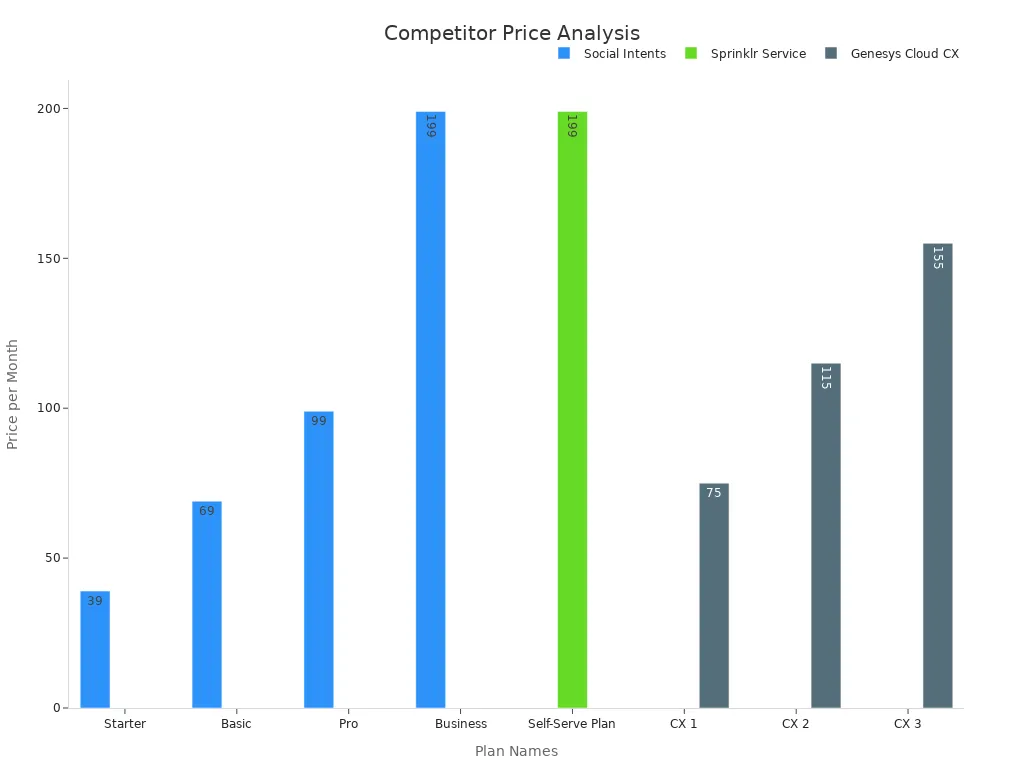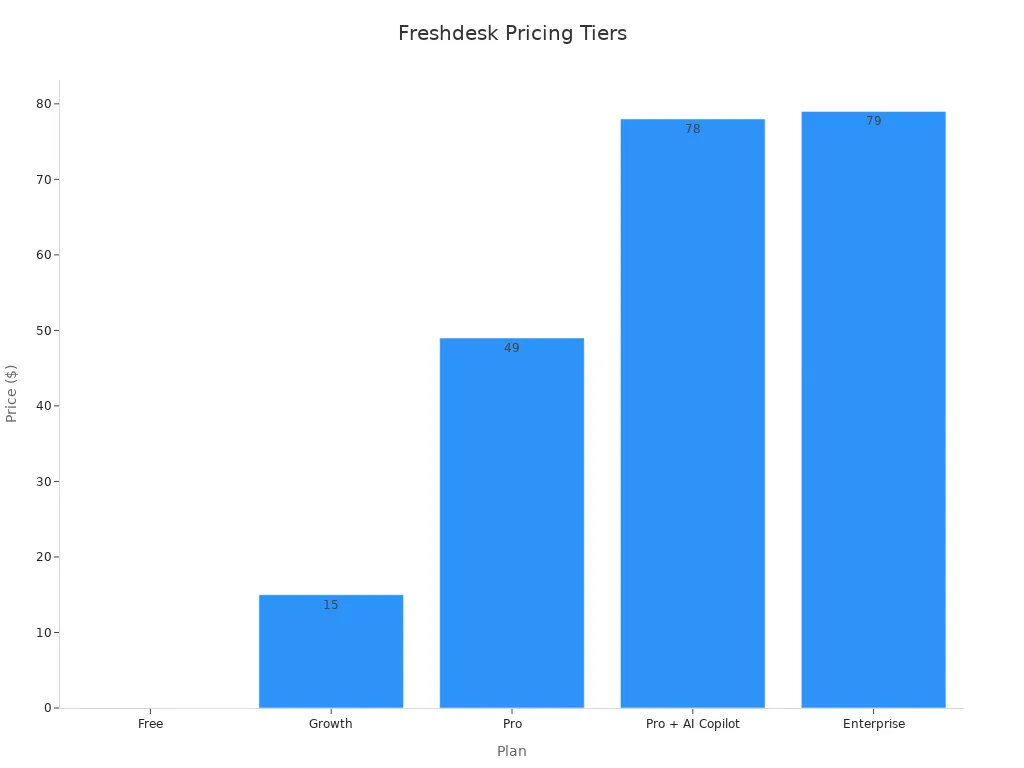Top Customer Service Management Systems for Every Business

Understanding what is customer service management system and selecting the right one in 2025 is more crucial than ever. Why? Customers demand faster responses and tailored experiences. With advanced tools like AI and automation, businesses can rise to these expectations while improving operational efficiency. For instance:
- AI-powered systems can save agents up to 1.2 hours daily by classifying and routing service issues.
- Nearly 70% of customer interactions can now be automated, ensuring smoother operations.
- Over 79% of companies recognize automation as essential for delivering exceptional customer experiences.
A solution like Sobot not only redefines what is customer service management system but also enhances customer engagement and loyalty by unifying communication channels and optimizing processes.
What is Customer Service Management System?
Definition and Purpose
A customer service management system is your go-to tool for handling customer interactions across various channels. It’s designed to streamline communication, improve efficiency, and boost customer satisfaction. Think of it as the backbone of your customer support operations. Whether you're managing emails, live chats, or phone calls, this system ensures everything runs smoothly.
Why does it matter? Because happy customers stick around. A well-implemented system helps you retain customers by offering quick resolutions, personalized experiences, and consistent service. Metrics like Customer Satisfaction (CSAT), Net Promoter Score (NPS), and First Contact Resolution rate show how effective these systems are in improving the customer journey.
Key Features of Modern Systems
Modern customer service management systems come packed with features that make your life easier. Here’s a quick look at what they offer:
| Feature | Description |
|---|---|
| Shared Inbox & Collaboration | Centralizes all customer emails for seamless teamwork and faster response times. |
| Automation features | Automates repetitive tasks like email routing and canned responses, freeing up agents for complex issues. |
| Reporting & Analytics | Tracks key metrics like agent performance and customer satisfaction to identify areas for improvement. |
| Omnichannel Support | Manages inquiries across various channels (email, chat, social media) within a unified platform for a smooth customer experience. |
These features aren’t just fancy add-ons. They’re essential for managing self-service portals, ticket management systems, and knowledge base management. By automating tasks and providing real-time insights, these tools help you focus on what matters most—your customers.
Importance in 2025
Customer expectations are skyrocketing, and businesses need to keep up. In 2025, customer service management systems will be more critical than ever. Here’s why:

Statistics show that 49% of customers leave brands due to poor experiences, while 72% demand immediate service. AI-powered tools are stepping in to bridge the gap. In fact, 80% of executives report improved customer satisfaction thanks to AI. Conversational AI is expected to grow by 22%, making it a game-changer for customer retention.
By adopting advanced systems, you can offer personalized experiences, reduce churn, and enhance the customer journey. These tools aren’t just about solving problems—they’re about building lasting relationships.
Zendesk: A Leader in AI-Powered Customer Support

Key Features of Zendesk
Zendesk stands out as a top choice for businesses looking to elevate their customer support. Its features are designed to simplify your operations while delivering exceptional service. Here’s what makes Zendesk shine:
- AI-Powered Automation: Zendesk uses AI to automate repetitive tasks, like ticket routing and response suggestions. This saves time and lets your agents focus on more complex issues.
- Omnichannel Support: Manage all customer interactions—whether through email, chat, or social media—from one unified platform.
- Customizable Dashboards: Track performance metrics like ticket resolution time and customer satisfaction in real-time.
- Self-Service Options: Empower customers with a knowledge base and AI-driven chatbots for quick answers.
According to the Zendesk Customer Experience Trends Report 2024, over two-thirds of customer service organizations believe AI improves interactions. Zendesk’s approach ensures faster, more personalized support while fostering human connections.
Benefits for Businesses
Zendesk doesn’t just make your life easier—it transforms your customer support into a competitive advantage. Here’s how:
- Boosts Efficiency: Automating tasks and streamlining workflows means your team can handle more inquiries in less time.
- Improves Customer Satisfaction: Metrics like CSAT and ticket resolution time show how Zendesk helps you deliver better service.
- Enhances Agent Performance: With tools to monitor and analyze agent productivity, you can identify strengths and areas for improvement.
| Metric | Description |
|---|---|
| Customer Satisfaction Score (CSAT) | Measures how happy customers are with your service. |
| Ticket Resolution Time | Tracks how quickly your team resolves issues, impacting overall satisfaction. |
| Agent Performance Metrics | Evaluates how well your agents handle inquiries and resolve problems. |
Zendesk’s tools help you create a seamless customer experience, keeping your customers happy and loyal.
Pricing and Plans
Zendesk offers flexible pricing to suit businesses of all sizes. Whether you’re a startup or an enterprise, there’s a plan for you.
| Feature/Plan | Intercom Pricing (per seat/month) | Zendesk Pricing (per agent/month) |
|---|---|---|
| Suite Team | N/A | $55 |
| Suite Growth | N/A | $89 |
| Suite Professional | N/A | $115 |
| Suite Enterprise | N/A | Pricing upon request |
| Add-ons | Fin AI Agent: $0.99 per resolution, Fin AI Copilot: $29 | Advanced AI: $50, Workforce Management: $25 |
Zendesk’s pricing reflects its robust features and scalability. While it may seem higher than some competitors, the value it delivers in terms of customer support efficiency and satisfaction makes it worth every penny.
Best Use Cases for Zendesk
Zendesk isn’t just a tool—it’s a game-changer for businesses that want to deliver top-notch customer service. But where does it shine the most? Let’s dive into some of the best use cases for Zendesk.
1. E-commerce Businesses
Running an online store means juggling customer inquiries about orders, returns, and shipping. Zendesk’s omnichannel support lets you manage all these questions in one place. Whether customers reach out via email, chat, or social media, you can respond quickly without switching platforms. Plus, its self-service options, like FAQs and chatbots, help customers find answers on their own.
Tip: Use Zendesk’s analytics to track common issues and update your knowledge base. This reduces repetitive questions and saves time for your team.
2. Tech Companies with Complex Products
If you’re in tech, you know how tricky troubleshooting can get. Zendesk’s ticketing system organizes customer issues and prioritizes them based on urgency. Agents can access detailed customer histories, making it easier to resolve problems without asking the same questions repeatedly. Its AI-powered tools even suggest solutions, speeding up the process.
3. Small Businesses Scaling Up
Growing businesses often struggle to keep up with increasing customer demands. Zendesk’s automation features handle repetitive tasks like ticket routing and canned responses. This frees up your team to focus on building relationships with customers. Its flexible pricing plans also make it accessible for businesses just starting out.
4. Global Enterprises
For companies with customers worldwide, Zendesk’s multilingual support and customizable workflows are lifesavers. You can offer personalized service across different time zones and languages. Its dashboards help you monitor performance across regions, ensuring consistent service quality everywhere.
5. Customer-Centric Industries
Industries like hospitality and healthcare thrive on exceptional customer experiences. Zendesk’s tools help you deliver personalized service by tracking customer preferences and past interactions. This builds trust and loyalty, which are crucial in these sectors.
Zendesk adapts to your needs, whether you’re a small startup or a global powerhouse. It’s not just about solving problems—it’s about creating experiences your customers will remember.
Sobot: All-in-One Contact Center Solution
Overview of Sobot’s Omnichannel Capabilities
Sobot makes managing customer interactions across multiple channels feel effortless. Its omnichannel solution brings everything—emails, live chats, social media messages, and phone calls—into one unified platform. You don’t have to jump between systems anymore. Instead, you can handle all inquiries from a single workspace.
Why does this matter? Because seamless communication builds trust. Sobot’s platform ensures your customers get consistent service, no matter how they reach out. It also uses AI-driven automation to handle repetitive queries, freeing up your team to focus on more complex issues.
Here’s what makes Sobot stand out:
- Customer-first approach: Sobot’s integrated solution prioritizes customer satisfaction.
- Proven results: Samsung saw a 30% boost in agent efficiency and achieved a 97% CSAT score after adopting Sobot.
- Unified platform: Agents can manage multiple channels without switching systems, improving service efficiency.
With Sobot, you can deliver fast, personalized service that keeps your customers coming back.

Key Features of Sobot Voice/Call Center
Sobot’s voice/call center capabilities are designed to make your life easier. Whether you’re handling inbound calls or managing outbound campaigns, Sobot has the tools to help you succeed.
Here’s what you’ll love about it:
- Intelligent IVR: Customize greetings, route calls smartly, and go live instantly with a drag-and-drop interface.
- Real-time monitoring: Track KPIs and address issues as they happen.
- Post-call analysis: Use call recordings to provide targeted feedback and training.
- Task assignment system: Align tasks with your team’s expertise to boost productivity.
- CRM integration: Save time by connecting Sobot with your existing systems.
These features don’t just improve efficiency—they enhance the customer experience. For example, intelligent dialing strategies increase connection rates, while AI-powered voicebots handle routine calls with ease.
Benefits for Businesses of All Sizes
Sobot’s solutions aren’t just for big companies. Whether you’re running a small business or managing a global enterprise, Sobot adapts to your needs.
Here’s how it helps:
- Small businesses: Automate repetitive tasks and focus on building relationships with your customers.
- Medium-sized companies: Use real-time analytics to optimize team performance and improve service quality.
- Large enterprises: Offer personalized service across time zones and languages with Sobot’s global network.
Sobot’s platform doesn’t just save time—it drives results. Businesses using Sobot report higher customer satisfaction, better agent efficiency, and smoother operations. With tools like AI-driven chatbots and unified workspaces, you can deliver exceptional service every time.
Use Cases Across Industries
Sobot’s all-in-one contact center solution isn’t just a one-size-fits-all tool. It adapts to the unique needs of different industries, helping businesses deliver exceptional customer experiences. Let’s explore how Sobot works its magic across various sectors.
1. Retail and E-commerce
In retail, customers expect quick answers about orders, returns, and product availability. Sobot’s omnichannel platform lets you manage inquiries from email, chat, and social media in one place. AI-driven chatbots handle repetitive questions like “Where’s my order?” while your team focuses on more complex issues.
Tip: Use Sobot’s analytics to track customer behavior and personalize your responses. This builds trust and keeps shoppers coming back.
2. Financial Services
Handling sensitive customer data requires precision and security. Sobot’s encrypted data transfer and seamless CRM integration make it a perfect fit for banks and financial institutions. Whether it’s guiding customers through loan applications or resolving account issues, Sobot ensures smooth communication.
3. Gaming Industry
Gamers demand fast support, especially during live events or tournaments. Sobot’s real-time monitoring and AI-powered voicebots help resolve issues quickly. Plus, its multilingual support ensures you can assist players worldwide without missing a beat.
4. Education
Educational institutions often deal with a flood of inquiries during admissions. Sobot’s unified workspace helps your team manage these efficiently. Automated workflows and chatbots answer FAQs, freeing up staff to handle more personalized interactions.
5. Global Enterprises
For large companies like Samsung, Sobot’s omnichannel solution simplifies managing customer interactions across time zones. Its robust analytics and customizable workflows ensure consistent service quality, no matter where your customers are.
Sobot’s versatility makes it a game-changer for businesses of all sizes. Whether you’re in retail, finance, or gaming, Sobot helps you deliver fast, personalized service that keeps your customers happy.
Salesforce Service Cloud: Comprehensive CRM Integration
Salesforce Service Cloud is a powerhouse when it comes to customer relationship management. It’s not just a tool—it’s a complete solution that helps you deliver exceptional customer experiences while keeping your team productive and efficient.
Features That Set Salesforce Apart
Salesforce Service Cloud offers features that make managing customer interactions a breeze. Here’s what stands out:
- Robust Case Management: You won’t miss a single customer issue. The system automatically handles incoming cases, sends auto-response emails, and assigns tasks to the right agents.
- Omni-Channel Support: Whether your customers prefer email, chat, or social media, Salesforce connects all channels into one platform. Your agents can manage everything without switching systems.
- Self-Service Options: Tools like Lightning Knowledge and Einstein Bots empower customers to find answers on their own. This reduces the workload on your team while improving customer satisfaction.
These features aren’t just about convenience—they’re about creating seamless workflows and better customer experiences.
Benefits of Using Salesforce Service Cloud
Why should you choose Salesforce Service Cloud? Because it transforms how you manage customer relationships. Here’s how it helps:
| Benefit | Description |
|---|---|
| Better collaboration | Teams access the same customer data, improving communication and teamwork. |
| More efficient and productive teams | All data stays in one system, reducing time spent switching between applications. |
| Improved data accuracy and analysis | Automatic syncing ensures your team works with accurate, up-to-date information. |
| Increased sales | Integrated customer data helps you turn leads into sales with personalized marketing. |
| Better customer service | A complete view of customer history speeds up case resolution and enhances customer experiences. |
With Salesforce, you’ll see higher productivity, better collaboration, and improved customer retention.
Pricing Overview
Salesforce Service Cloud offers flexible pricing plans tailored to your needs. Here’s how it compares to competitors:
| Competitor | Plan Name | Price (per month) | Features |
|---|---|---|---|
| Social Intents | Starter | $39 | 1 chat widget, 200 chat conversations |
| Basic | $69 | 2 chat widgets, 1000 chat conversations | |
| Pro | $99 | 5 chat widgets, 5000 conversations | |
| Business | $199 | 10 chat widgets, 10,000 conversations, real-time auto-translation | |
| Sprinklr Service | Self-Serve Plan | $199 | Omnichannel support across 15+ channels, AI chatbots |
| Enterprise Plan | Custom Pricing | Advanced features, omnichannel support on 30+ channels | |
| Genesys Cloud CX | CX 1 | $75 | Voice channels, call routing, IVR, outbound campaigns |
| CX 2 | $115 | All CX 1 features, plus digital channels, omnichannel routing | |
| CX 3 | $155 | Adds WEM, speech and text analytics, advanced AI tools |

Salesforce’s pricing reflects its robust features and scalability. While it may seem higher than some competitors, the value it delivers in terms of CRM tools and customer relationship management makes it a worthwhile investment.
Ideal Industries and Business Sizes
When it comes to choosing the right customer service system, you might wonder if it fits your industry or business size. The good news? Salesforce Service Cloud works for almost everyone. Whether you're running a small startup or managing a global enterprise, this platform has something for you.
Industries That Benefit Most
- Retail and E-commerce: If you’re in retail, you know how important it is to keep customers happy. Salesforce helps you manage orders, returns, and inquiries with ease. Its crm tools let you track customer preferences and offer personalized experiences.
- Healthcare: In healthcare, quick responses can make all the difference. Salesforce’s customer relationship management features ensure patients get the support they need, fast.
- Financial Services: Banks and financial institutions rely on accurate data. Salesforce integrates seamlessly with your systems, making it easier to manage accounts and resolve issues.
- Technology Companies: If you’re in tech, you’ll love how Salesforce organizes complex customer issues. Its crm tools help you prioritize tasks and improve response times.
- Education: Schools and universities can use Salesforce to handle admissions, student inquiries, and more. It’s a one-stop solution for managing communication.
Business Sizes
Salesforce isn’t just for big companies. Small businesses can use its crm tools to automate tasks and save time. Medium-sized companies benefit from its analytics, which help you track performance and improve efficiency. For large enterprises, Salesforce offers advanced customer relationship management features that scale with your needs.
No matter your industry or size, Salesforce Service Cloud helps you deliver exceptional service. It’s not just a tool—it’s a partner in your success.
Freshdesk: Affordable and Scalable Solution
Freshdesk is a favorite among businesses looking for a cost-effective way to manage customer support. It’s designed to grow with you, offering tools that simplify operations and improve customer satisfaction. Whether you’re running a startup or a midsize company, Freshdesk has something for everyone.
Freshdesk’s Core Features
Freshdesk packs a punch with features that make customer service management a breeze. Here’s what you’ll find:
| KPI | Description |
|---|---|
| First Contact Resolution Rate | Resolves issues in the first interaction, boosting efficiency and customer satisfaction. |
| Ticket Distribution | Tracks the volume and types of issues, helping you understand customer needs better. |
These features aren’t just about handling tickets—they’re about creating smoother workflows and happier customers. Freshdesk also integrates AI-powered tools to automate repetitive tasks, like ticket routing and canned responses. This frees up your team to focus on more complex issues.
Tip: Use Freshdesk’s reporting tools to analyze customer inquiries and improve your support strategies.
Advantages for Small and Medium Businesses
Freshdesk shines when it comes to helping smaller teams deliver big results. Here’s why:
- Users love its simple ticket management system.
- AI tools streamline operations, saving time and effort.
- You can connect with customers across multiple channels from one platform.
- Integration with third-party apps is quick and easy.
| Feature | Details |
|---|---|
| Supported Business Types | Startups and small to midsize businesses |
| Pricing | Free for up to 2 users; Growth at $15/user; Pro at $49/user; Enterprise at $79/user |
| Free Trial | 14 days |
| Standout Features | Ticket management, Self-service, AI-powered automations, Ticket collaboration, Reporting and analytics |
| Customer Support | 24×5 support via email, phone, and live chat |
Freshdesk’s affordability and scalability make it perfect for businesses that want to enhance customer support without breaking the bank.
Pricing Tiers
Freshdesk offers flexible plans to suit different budgets and needs.
| Plans | Pricing (Annual billing) | Key features | Best for |
|---|---|---|---|
| Free | $0 for up to 2 agents | * Shared inbox * Integrated knowledge base * Team collaboration tools via threads | * Startups * Small businesses |
| Growth | $15/agent/month | * Everything in Free plan * Reports * Real-time dashboards * Customer portal * Automated workflows | * Small businesses |
| Pro | $49/agent/month | * Everything in Growth plan * Customized support portals * Custom objects * Advanced ticketing * Custom reporting * Different routing mechanisms | * Medium-sized businesses * Growing teams |
| Pro + AI Copilot | $78/agent/month | * Everything in Pro plan plus Freddy AI Copilot | * Businesses looking for more advanced capabilities of Freddy AI Copilot |
| Enterprise | $79/agent/month | * Everything in Pro plan * Audit logs * Additional security features * Approved workflows * Skill-based assignment | * Large enterprise |

Freshdesk’s pricing tiers ensure you get the features you need without overspending. Whether you’re just starting out or scaling up, there’s a plan tailored for you.
Use Cases for Freshdesk
Freshdesk isn’t just a tool—it’s a solution that adapts to the unique needs of different industries. Whether you’re in retail, education, or even public services, Freshdesk helps you deliver exceptional customer experiences. Let’s explore how businesses across various sectors use Freshdesk to solve their challenges.
Practical Applications Across Industries
Freshdesk has proven its value in real-world scenarios. Here’s a look at how companies from different sectors have benefited:
| Market Sector | Company Name | Key Challenge | Solution Provided |
|---|---|---|---|
| Hospitality | Cinnamon Hotels & Resorts | Managing online inquiries across multiple properties. | Centralized team focused on online inquiries using Freshdesk. |
| Fitness | Cure.fit | Maintaining agile support and increasing ticket resolution speed. | Adopted Freshdesk for comprehensive customer interaction management. |
| Telecommunications | Felix Mobile | Need for a unique selling proposition in a saturated market. | Integrated Freshdesk for a seamless omnichannel customer service experience. |
| Retail | CeX WeBuy | Surge in customer inquiries during COVID-19 pandemic. | Leveraged Freshdesk to manage increased ticket volumes effectively. |
| Education | Glenbrook High School District | Outdated support systems leading to inefficiencies. | Transitioned to Freshdesk for a streamlined support structure. |
| Tourism | Big Bus Tours | Scattered support team lacking visibility into customer context. | Built a unified support hub with Freshdesk Omnichannel for improved customer service experience. |
Why Freshdesk Works for Everyone
Freshdesk’s flexibility makes it a favorite across industries. For example, in retail, it helps manage high volumes of customer inquiries during peak seasons. In education, it streamlines support systems, ensuring students and staff get quick resolutions. Even in tourism, Freshdesk unifies scattered teams, improving response times and customer satisfaction.
Tip: Use Freshdesk’s analytics to identify trends in customer inquiries. This helps you proactively address common issues and improve your service.
No matter your industry, Freshdesk empowers you to deliver fast, efficient, and personalized support. It’s not just about solving problems—it’s about building lasting relationships with your customers.
HubSpot Service Hub: All-in-One Platform
Key Features of HubSpot Service Hub
HubSpot Service Hub is packed with tools that make managing customer relationships a breeze. It’s designed to help you deliver exceptional service while keeping your team organized and efficient. Here’s what you’ll love:
- Shared Inbox: Keep all customer conversations in one place. Your team can collaborate easily and respond faster.
- Knowledge Base: Create a self-service library for your customers. They can find answers on their own, reducing the number of support tickets.
- Customer Feedback Tools: Collect feedback directly from your customers. Use it to improve your service and build stronger relationships.
- Automation: Automate repetitive tasks like ticket routing and follow-ups. This saves time and lets your team focus on solving complex issues.
These features don’t just simplify your work—they also improve the customer experience. For example, faster response times and self-service options make customers feel valued and heard.
Benefits for Customer Success Teams
HubSpot Service Hub isn’t just a tool; it’s a game-changer for your customer success team. It helps you work smarter, not harder. Here’s how:
- Boosts Efficiency: Automation and shared inboxes reduce the time spent on repetitive tasks.
- Improves Customer Satisfaction: Metrics like CSAT and average response time show how well your team is performing.
- Enhances Team Collaboration: Everyone stays on the same page with a unified platform.
Did you know? HubSpot Service Hub tracks key metrics like Customer Satisfaction (CSAT), Average Ticket Count, and Average Response Time. These insights help you identify what’s working and where you can improve.
Pricing and Subscription Options
HubSpot Service Hub offers flexible pricing plans to fit businesses of all sizes. Whether you’re a startup or a large enterprise, there’s an option for you:
| Plan | Price (per month) | Key Features |
|---|---|---|
| Starter | $50 | Shared inbox, ticketing, and live chat. |
| Professional | $400 | Advanced automation and reporting tools. |
| Enterprise | $1,200 | Custom objects and advanced analytics. |
HubSpot’s pricing ensures you get the tools you need without overspending. Plus, its scalability means you can upgrade as your business grows.
Best Fit for HubSpot Service Hub
HubSpot Service Hub works best for businesses that want to simplify customer service while scaling their operations. Whether you're running a small startup or managing a large enterprise, this platform adapts to your needs. Let’s explore who benefits the most from HubSpot Service Hub.
1. Small Businesses Looking to Grow
If you're just starting out, HubSpot Service Hub gives you the tools to manage customer inquiries without overwhelming your team. Features like shared inboxes and live chat make it easy to stay organized. You can automate repetitive tasks like ticket routing, saving time for more important work.
Tip: Use the Starter plan to get essential features like ticketing and live chat at an affordable price.
2. Medium-Sized Companies Scaling Up
As your business grows, managing customer relationships becomes more complex. HubSpot’s Professional plan offers advanced automation and reporting tools to help you stay on top of things. You can track metrics like average response time and customer satisfaction to improve your service.
3. Large Enterprises Needing Customization
For big companies, HubSpot’s Enterprise plan provides advanced features like custom objects and analytics. You can tailor workflows to fit your unique needs. This plan is perfect for teams that handle high volumes of customer interactions across multiple channels.
| Business Type | Recommended Plan | Key Features |
|---|---|---|
| Small Businesses | Starter | Shared inbox, live chat, ticketing |
| Medium-Sized Companies | Professional | Automation, reporting, customer feedback |
| Large Enterprises | Enterprise | Custom objects, advanced analytics |
4. Customer-Centric Industries
Industries like retail, healthcare, and education thrive on strong customer relationships. HubSpot helps you deliver personalized service by tracking customer preferences and past interactions. This builds trust and keeps customers coming back.
Note: HubSpot’s knowledge base feature is great for creating self-service options, reducing the workload on your team.
HubSpot Service Hub isn’t just a tool—it’s a partner in your growth. It helps you deliver exceptional service, no matter your industry or business size.
Intercom: Conversational Support at Its Best

Intercom has earned its reputation as a leader in conversational customer support. If you're looking for a tool that connects you with your customers in real time, this platform delivers. Its features are designed to make every interaction seamless and meaningful.
Features of Intercom
Intercom’s feature set is all about making communication easier and more effective. Here’s what you can expect:
| Feature | Description |
|---|---|
| Live Chat | Provides real-time communication with customers, enhancing engagement. |
| Automated Messaging | Enables targeted and personalized messages to be sent at optimal times. |
| Customer Segmentation | Allows businesses to tailor their communication strategies based on user characteristics. |
| Team Collaboration Features | Facilitates effective teamwork and streamlines workflows for better customer support. |
| Developer API and Customization | Offers extensive options for integration and customization to fit specific business needs. |
These tools don’t just help you respond faster—they also let you personalize every interaction. Whether it’s live chat or automated messaging, Intercom ensures your customers feel heard and valued.
Benefits for Real-Time Customer Engagement
Why does conversational support matter? Because it keeps your customers coming back. Studies show that:
- 60% of support leaders reported improved customer retention due to conversational support.
- 58% noted increased business efficiency.
- 58% experienced enhanced customer satisfaction.
- 71% believe scaling conversational support is essential to remain competitive.
Intercom’s live chat and automated messaging make it easy to engage with customers instantly. You can send personalized messages, answer questions, and even solve problems—all in real time. Plus, its customer segmentation feature helps you target specific groups, ensuring your communication feels relevant and timely.
Tip: Use Intercom’s analytics to track customer interactions. This helps you identify trends and improve your engagement strategies.
Pricing and Scalability
Intercom offers flexible pricing plans to suit businesses of all sizes. Whether you’re a startup or a large enterprise, there’s an option for you. Its scalable features grow with your business, making it a long-term solution for customer support. While exact pricing depends on your needs, Intercom’s value lies in its ability to enhance customer satisfaction and streamline operations.
If you’re ready to take your customer engagement to the next level, Intercom is a tool worth exploring. It’s not just about answering questions—it’s about building lasting relationships.
Industries That Benefit Most from Intercom
Intercom’s conversational support tools work wonders across a variety of industries. Whether you’re running a tech startup or managing a retail empire, this platform helps you connect with customers in meaningful ways. Let’s explore some industries where Intercom truly shines.
1. E-commerce and Retail
If you’re in e-commerce, you know how important it is to keep customers happy. Intercom’s live chat lets you answer questions about products, shipping, or returns instantly. Automated messaging also helps you send personalized recommendations based on customer behavior. This keeps shoppers engaged and boosts sales.
Pro Tip: Use Intercom’s customer segmentation to send targeted promotions. It’s a great way to turn one-time buyers into loyal customers.
2. SaaS and Technology
Tech companies often deal with complex customer inquiries. Intercom’s real-time chat and knowledge base make it easier to provide quick, accurate answers. You can even use automated workflows to guide users through troubleshooting steps. This reduces frustration and improves user retention.
3. Healthcare
In healthcare, timely communication is critical. Intercom helps you provide instant support to patients, whether they’re booking appointments or asking about services. Its secure messaging ensures sensitive information stays private, building trust with your audience.
4. Education
Schools and universities can use Intercom to manage student inquiries during admissions or course registrations. Automated responses handle FAQs, while live chat connects students with advisors for more personalized support.
5. Financial Services
Banks and financial institutions benefit from Intercom’s secure and efficient communication tools. You can assist customers with account issues or loan applications in real time, improving satisfaction and loyalty.
Note: Intercom’s multilingual support makes it ideal for global businesses. You can serve customers in their preferred language without missing a beat.
No matter your industry, Intercom helps you deliver fast, personalized service. It’s not just a tool—it’s a way to build stronger relationships with your customers.
Other Noteworthy Mentions
Zoho Desk: Budget-Friendly and Customizable
If you're looking for a cost-effective solution that doesn’t skimp on features, Zoho Desk might be your perfect match. It’s known for its budget-friendly pricing and flexibility, making it a favorite among businesses of all sizes.
Here’s what makes Zoho Desk stand out:
- It offers omnichannel support, so you can manage emails, chats, and social media messages from one place.
- The platform includes self-service options and sentiment analysis, helping you understand customer emotions better.
- Zoho Desk integrates seamlessly with other platforms, especially the Zoho Suite, making it a great choice if you already use their tools.
The AI-powered assistant, Zia, takes things up a notch. It helps with ticket management and even analyzes customer sentiment to prioritize issues. Plus, the single-view dashboard keeps everything organized, so your team can focus on delivering excellent service.
Genesys Cloud CX: Advanced Call Center Capabilities
Genesys Cloud CX is a powerhouse for businesses that rely heavily on call centers. It’s designed to handle complex customer interactions while keeping things simple for your team.
What makes Genesys Cloud CX special? Its advanced call routing ensures customers always reach the right agent. The platform also supports voice, chat, and email, giving you the flexibility to connect with customers however they prefer.
Real-time analytics is another highlight. You can monitor performance metrics like call resolution time and agent productivity. This helps you identify areas for improvement and optimize your operations. If you’re managing a large team or handling high call volumes, Genesys Cloud CX is a reliable choice.
Help Scout: Simple and Effective for Small Teams
For small teams, Help Scout offers a straightforward yet powerful solution. It’s designed to keep things simple while ensuring you deliver top-notch customer support.
Help Scout’s shared inbox is a game-changer. It lets your team collaborate effortlessly, so nothing slips through the cracks. The platform also includes a knowledge base feature, allowing customers to find answers on their own.
What’s more, Help Scout focuses on personalization. You can view customer profiles and past interactions, making every conversation feel tailored. It’s perfect for small businesses that want to build strong relationships without overcomplicating their processes.
Tip: If you’re just starting out, Help Scout’s simplicity and affordability make it an excellent choice.
Customer service management systems are more than tools—they’re your secret weapon for thriving in 2025. They help you deliver faster responses, personalized experiences, and seamless communication. Whether you’re a small business or a global enterprise, these systems make your operations smoother and your customers happier.
Each platform has its strengths. Zendesk excels at AI-powered automation. Sobot shines with its omnichannel capabilities and voice/call center tools. Salesforce Service Cloud is perfect for CRM integration, while Freshdesk offers affordability and scalability. HubSpot Service Hub simplifies workflows, and Intercom leads in conversational support.
So, which one fits your business? Here’s a quick guide:
| Business Size | Best Options |
|---|---|
| Small (1-99 employees) | HubSpot for simplicity, Zoho CRM for affordability, Zendesk for customer service. |
| Medium (100-999 employees) | Salesforce for scalability, Sobot for omnichannel support, Freshdesk for growth. |
| Large (+1000 employees) | Salesforce for complex needs, Zendesk for robust customer support. |
No matter your industry, these tools help you build lasting relationships with your customers. Choose the one that aligns with your goals, and watch your business thrive!
FAQ
What is the main purpose of a customer service management system?
A customer service management system helps you handle customer interactions efficiently. It streamlines communication, automates repetitive tasks, and ensures faster resolutions. This keeps your customers happy and your team productive.
How do I choose the right system for my business?
Start by identifying your needs. Do you need omnichannel support, automation, or analytics? Compare features, pricing, and scalability. Tools like Sobot are great for businesses seeking all-in-one solutions, while others like Zendesk excel in AI-powered automation.
Can small businesses benefit from these systems?
Absolutely! Small businesses can use these tools to save time, automate tasks, and deliver better customer experiences. Platforms like Freshdesk and HubSpot offer affordable plans tailored for startups and small teams.
Are these systems easy to integrate with existing tools?
Most modern systems, including Sobot and Salesforce, offer seamless integration with CRMs, e-commerce platforms, and other tools. This ensures you can connect everything without disrupting your workflow.
Do these systems support global businesses?
Yes! Many systems, like Sobot and Zendesk, provide multilingual support, time zone management, and global network capabilities. This makes them perfect for businesses with international customers.
Tip: Always check if the system supports your preferred languages and regions before committing.
See Also
Best Customer Support Tools to Consider in 2024
Effective Strategies for Quality Management in Call Centers
Comparative Analysis of Leading Voice of Customer Tools
Essential Principles for Call Center Quality Management Systems
